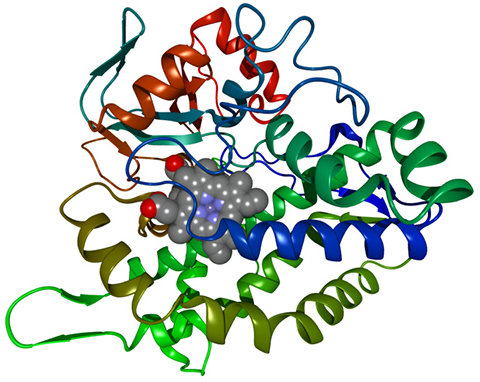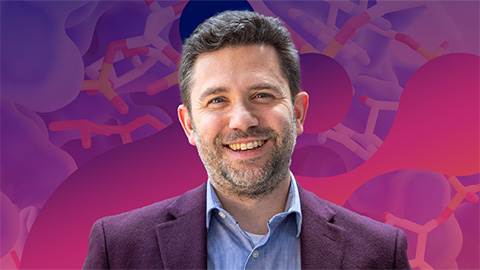Why cognition declines in Type 2 diabetes patients
For years, scientists have observed a correlation between the progression of Type 2 diabetes and the onset of cognitive impairment. A new theory about the cause of this, largely based on animal, cell and human genetics studies, implicates the cytochrome P450-soluble epoxide hydrolase, or CYP450-sEH, pathway in both Type 2 diabetes and cognitive decline.
CYP450s are enzymes that break down polyunsaturated fatty acids into epoxides, metabolites that are believed to have anti-inflammatory and cell-signaling properties. However, the sEH enzyme breaks down these epoxides into diols — molecules believed to be harmful to the cell.

Once epoxides are broken into diols, they can interfere with other normal metabolic pathways and physiological functions. Both epoxides and diols belong to the group of lipid metabolites called oxylipins.
Researchers also have found that the implicated pathway is prevalent in patients with obesity, which made a team at the University of Toronto and Sunnybrook Research Institute curious about whether an association exists between the oxylipins derived from the CYP450-sEH pathway and the three conditions: Type 2 diabetes, cognitive impairment and obesity.
According to Natasha Anita, a Ph.D. candidate at Toronto and Sunnybrook and first author of the study, the researchers were motivated to investigate this association because they had previously found “that oxylipin levels in the blood differed between people with and without small vessel disease in the brain and that the diols were associated with poorer cognitive performance and neurodegeneration.”
Knowing that diabetes increases the risk for small vessel complications and cognitive impairment, the team hypothesized that oxylipins would also be implicated in cognitive function in Type 2 diabetes patients. A report of their work was published recently in the Journal of Lipid Research.
Excluding individuals with Type 1 diabetes and neurological diagnoses, among other criteria, the researchers recruited 108 individuals with Type 2 diabetes; 51 were obese and 57 were not obese.
Using neuropsychological and verbal tests, the team assessed cognitive function, verbal fluency and mental agility. They also assessed learning and short-term and long-term memory.
In their JLR paper, the researchers wrote that their results largely agreed with the results of earlier studies in people without Type 2 diabetes. They found that increased levels of diols were associated with poorer cognitive performance.
“This is the first study to look at oxylipins in relation to cognition in Type 2 diabetes,” Anita said. “Although diabetes is an established risk factor for Alzheimer’s disease and dementia, currently there is no specific treatment for cognitive problems in this population.”
The results from this study show the CYP450-sEH pathway to be a strong potential target for therapies.
“Our current work adds to the growing number of clinical studies examining the CYP450-sEH oxylipin pathway,” Anita said. “We are hopeful that this indicates a new pharmacological target to prevent cognitive decline in this population.”
Moving forward, Anita said the team is investigating “whether these oxylipins are associated with cognitive decline over time, and whether targeting this pathway will improve cognition in people with diabetes.”
Enjoy reading ASBMB Today?
Become a member to receive the print edition four times a year and the digital edition monthly.
Learn moreGet the latest from ASBMB Today
Enter your email address, and we’ll send you a weekly email with recent articles, interviews and more.
Latest in Science
Science highlights or most popular articles

Redefining lipid biology from droplets to ferroptosis
James Olzmann will receive the ASBMB Avanti Award in Lipids at the ASBMB Annual Meeting, March 7–10, just outside of Washington, D.C.

Women’s health cannot leave rare diseases behind
A physician living with lymphangioleiomyomatosis and a basic scientist explain why patient-driven, trial-ready research is essential to turning momentum into meaningful progress.

Life in four dimensions: When biology outpaces the brain
Nobel laureate Eric Betzig will discuss his research on information transfer in biology from proteins to organisms at the 2026 ASBMB Annual Meeting.

Fasting, fat and the molecular switches that keep us alive
Nutritional biochemist and JLR AE Sander Kersten has spent decades uncovering how the body adapts to fasting. His discoveries on lipid metabolism and gene regulation reveal how our ancient survival mechanisms may hold keys to modern metabolic health.

Redefining excellence to drive equity and innovation
Donita Brady will receive the ASBMB Ruth Kirschstein Award for Maximizing Access in Science at the ASBMB Annual Meeting, March 7–10, just outside of Washington, D.C.

Mining microbes for rare earth solutions
Joseph Cotruvo, Jr., will receive the ASBMB Mildred Cohn Young Investigator Award at the ASBMB Annual Meeting, March 7–10, just outside of Washington, D.C.

